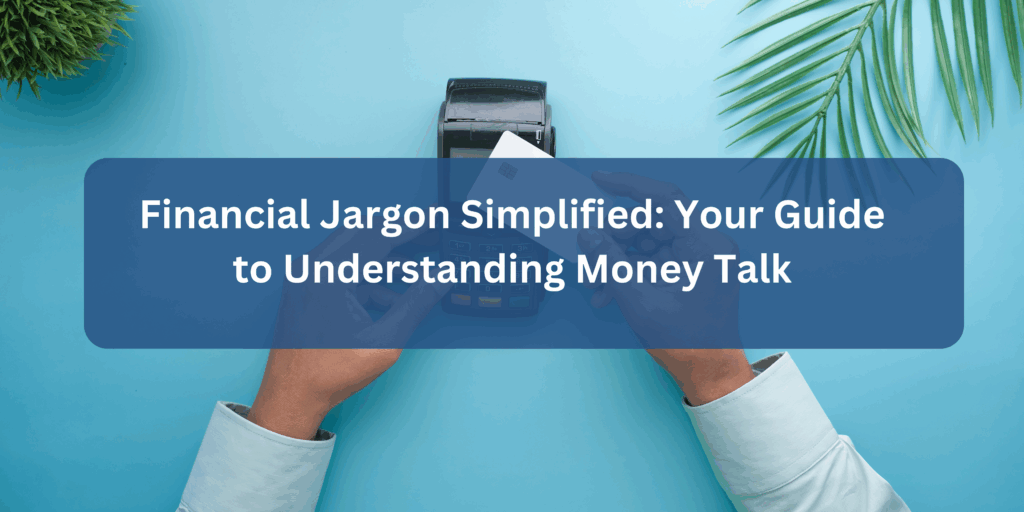
Financial Jargon Simplified: Your Guide to Understanding Money Talk
You're sitting in the bank, nodding along as your adviser rattles off terms like "compound interest," "equity," and "diversification," but inside you're completely lost, wondering if everyone else just magically knows what these words mean, and feeling too embarrassed to ask for clarification because surely you should understand this stuff by now. Sound familiar?
Don't worry – you're not alone. Financial jargon exists to make simple concepts sound complicated, but we're here to change that.
The Basics: Money Words You'll Actually Use
Interest Think of this as rent for borrowing money. When you take out a loan, you pay the lender a bit extra for letting you use their cash. When you save money, the bank pays you a bit extra for letting them use yours. Simple as that.
APR (Annual Percentage Rate) This is the real cost of borrowing money for a year, including all the fees and charges. It's like the full price tag on a loan – not just the sticker price, but everything you'll actually pay.
Credit Score Your financial report card, basically. It tells lenders how reliable you are at paying back money. Pay your bills on time, keep debt low, and your score goes up. Miss payments or max out credit cards, and it goes down.
The Saving and Investing Crowd
Compound Interest Einstein supposedly called this the eighth wonder of the world, and he wasn't wrong. It's when your money earns money, and then that money earns money too.
Here's how it works: You save £100 and earn 5% interest, so you have £105. Next year, you earn 5% on the full £105, not just your original £100. Over time, this snowball effect becomes massive.
Equity Simply put, it's ownership. If you own shares in a company, you have equity in that business. If you've paid off half your mortgage, you have 50% equity in your home. It's the bit that's actually yours.
Diversification Don't put all your eggs in one basket – that's diversification. Instead of investing all your money in one company or one type of investment, you spread it around. If one thing goes wrong, you haven't lost everything.
The Property Game
Mortgage A loan specifically for buying property. The house itself acts as security – if you can't pay, the lender can take the house. Most mortgages last 25-30 years, so you're essentially renting money for decades to buy your home.
Deposit The chunk of money you pay upfront when buying a house. If a house costs £200,000 and you put down a £20,000 deposit, you're borrowing £180,000. Bigger deposits usually mean better mortgage deals.
Remortgage Switching your mortgage to a new deal, either with your current lender or a different one. People do this to get better interest rates or release some equity from their home.
The Insurance Maze
Premium What you pay for insurance – monthly or yearly. Think of it as membership fees for financial protection.
Excess The amount you pay towards a claim before insurance kicks in. If your car repair costs £1,000 and your excess is £200, you pay £200 and insurance covers the remaining £800.
No Claims Bonus A reward for not claiming on your insurance. The longer you go without claiming, the bigger your discount becomes. It's insurance companies saying "thanks for not costing us money."
Credit Card Mysteries
Balance Transfer Moving debt from one credit card to another, usually to get a better interest rate. It's like switching energy suppliers, but for debt.
Minimum Payment The smallest amount you can pay on your credit card each month without penalty. But here's the thing – paying only the minimum means you'll be in debt for years and pay loads in interest.
Credit Limit The maximum amount you can borrow on your credit card. Just because you can borrow it doesn't mean you should – ideally, use less than 30% of your limit to keep your credit score healthy.
Making It Work for You
Understanding these terms isn't about impressing people at dinner parties. It's about making informed decisions with your money.
When someone mentions APR, you'll know to compare the full cost. When they talk about compound interest, you'll understand why starting to save early matters so much. When insurance salespeople mention excess, you'll know exactly what you're signing up for.
The financial world loves its jargon, but behind every complicated term is usually a pretty simple idea. Once you know what these words actually mean, you can ask better questions, make smarter choices, and feel confident in financial conversations.
After all, money talk shouldn't be a foreign language – it should be as clear as asking for directions to the nearest coffee shop.
At Sheffield Credit Union, we believe everyone deserves to understand their finances. If you'd like to chat about any of these terms or explore how we can help with your financial goals, pop in for a conversation. No jargon, we promise.
